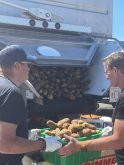The European Union’s 2012 rapeseed crop is seen sliding to a five-year low of 18.48 million tonnes this year, with several countries hit by an especially cold winter, Hamburg-based oilseeds analysts Oil World said April 17.
The disappointing crop means EU rapeseed supplies will again be tight in the forthcoming 2012-13 season and that EU rapeseed crushings are likely to decline, it said.
“A disaster is shaping up for this year’s rapeseed production in some parts of the European Union,” Oil World said.
The new estimate is down sharply from the 2011 harvest of 19.1 million tonnes and from Oil World’s April 10 forecast for 2012 of 19.2 million tonnes.
Read Also

Farming Smarter receives financial boost from Alberta government for potato research
Farming Smarter near Lethbridge got a boost to its research equipment, thanks to the Alberta government’s increase in funding for research associations.
Deep winter frosts in late February damaged rapeseed plants in some countries following poor development after a dry autumn in some regions, it said.
“Alarming reports have been received in recent days from Germany, Poland and France pointing to greater-than-expected damage from winter killing,” it said.
EU benchmark rapeseed futures in Paris touched 14-month highs on April 10 because of fears about winter damage to European crops coupled with expectations of poor South American soybean harvests.
Oil World said it expected major rapeseed crop losses in eastern EU countries.
Poland’s crop will fall to 1.85 million tonnes from 1.87 million last year, it said. Crops are likely to be lower as well in Romania, Bulgaria and Hungary, it said.
Germany’s 2012 crop still is forecast by Oil World to rise to 4.4 million tonnes from the weather-reduced 3.8 million tonnes last year. France’s harvest is likely to fall to 5.2 million tonnes from around 5.3 million, it said.
The crop in Britain, hit by drought after a cold snap in late February, is likely to fall to 2.6 million tonnes from 2.7 million tonnes, it said.
“We consider it unlikely that EU imports can be raised sufficiently to offset reduced domestic production,” Oil World said.
Heavier competition for supplies
Oil World chief executive Thomas Mielke told Reuters separately that the expected poor crop would create greater competition between global rapeseed-importing countries in the 2012-13 season and excellent sales opportunities for exporters.
“This could create a new competition scenario between the various rapeseed-importing countries, especially should the worldwide export supplies of rapeseed and canola be insufficient,” Mielke said.
Following a poor crop in 2011, the EU is forecast by Oil World to be the world’s largest rapeseed importer in the current 2011-12 season followed by Japan, China, Mexico and Pakistan.
Much of the global supply picture will depend on the development of the crops in key exporters Australia and Canada, both of which will have excellent sales prospects on global markets.
“The world market needs higher crops in Canada and Australia,” he said.
But it is too early to say whether this is possible, he added.
Wienke von Schenck, grains and oilseeds analyst at German agricultural information service AMI, said, “The way things are looking with the current crop forecasts is that the European food processing and biodiesel industry will again be facing tight rapeseed supplies and so possible high prices in the new season.
“I expect more EU rapeseed imports from Australia and Ukraine.”














